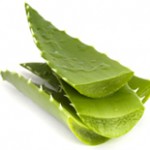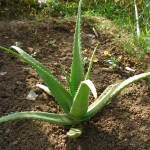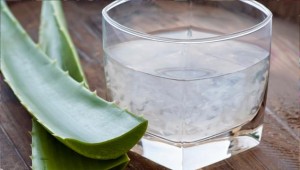Aloe Vera
Categories: Seasonal Healers
Aloe Vera (Aloe Barbadensis) Kumari
 Aloe Vera is a fascinating plant with many healing properties. It is also an Ayurvedic remedy widely available in the UK, and is therefore ideal as the first plant in this monthly series.
Aloe Vera is a fascinating plant with many healing properties. It is also an Ayurvedic remedy widely available in the UK, and is therefore ideal as the first plant in this monthly series.
Aloe Vera is a very short-stemmed plant that grows up to 100 cm tall. It has thick and fleshy leaves with serrated margins that open up like a flower from its centre stem.
Where does it grow? Aloe Vera thrives in dry and hot climates, and is found in India, Africa, Australia and the Caribbean, where it grows in the wild, and where its cultivation is also widespread. In the UK you can grow it too, as long as you keep it in a warm, sunny environment like a greenhouse.
What are the parts used? Aloe Vera leaves contain a transparent sticky gel that is taken out for use.
What are its properties and uses?Aloe Vera has a long history of use throughout the East and West, which has made it quite popular to this day. It is traditionally used externally, to improve skin tone and complexion and to treat burns and skin conditions; but also internally, for digestive ailments and purgative purposes. Women of the East, including India, hold Aloe Vera in high regard for its rejuvenating and healing properties on their reproductive system. The plant is often used by Ayurvedic practitioners to effectively relieve menstrual disorders.
According to the Sanskrit text Bhava Prakash, Aloe Vera is:
- A purgative, effective in breaking down intestinal waste.
- A cooling, bitter plant that is good for the eyes and rejuvenating for the body and mind.
- A sweet, nourishing and strengthening plant for all body systems. It corrects imbalanced vata (the vital principle governing movement in every cell, tissue, organ and system).
- A cure for digestive disorders, being particularly good for treating the liver and spleen.
- An effective treatment for tumours, burns, skin diseases and blood disorders.
 How does it work? The greatness of Aloe Vera lies in its ability to balance all vital principles of the body. Aloe Vera is a natural cleanser. When taken internally it gives a gentle bowel elimination, and in doing so restores the natural downward movement of vata. It corrects women’s menstrual disorders also by removing accumulated toxins and restoring a healthy flow and pattern. Its bitterness and cooling potency make it useful for managing pitta (the vital principle that governs all metabolic activities in the body) and its disorders, such as inflammation, ulcers, skin diseases, blood and endocrine disorders. Its nourishing properties make it an invigorating tonic that restores diminished kapha (the vital principle that holds together all structures of our body and mind).
How does it work? The greatness of Aloe Vera lies in its ability to balance all vital principles of the body. Aloe Vera is a natural cleanser. When taken internally it gives a gentle bowel elimination, and in doing so restores the natural downward movement of vata. It corrects women’s menstrual disorders also by removing accumulated toxins and restoring a healthy flow and pattern. Its bitterness and cooling potency make it useful for managing pitta (the vital principle that governs all metabolic activities in the body) and its disorders, such as inflammation, ulcers, skin diseases, blood and endocrine disorders. Its nourishing properties make it an invigorating tonic that restores diminished kapha (the vital principle that holds together all structures of our body and mind).
How is it prepared? The whole plant can be crushed and then filtered to extract bulk quantities of Aloe Vera juice. This can be bought in the market. Pukka herbs is a good provider in the UK. For small quantities of juice, Aloe Vera gel can easily be extracted from the plant’s thick matured leaves by cutting them across the side. This gel can be applied directly to the skin or taken in a glass to drink, by mixing it with warm water, a bit of honey and black pepper.
Note that for some individuals, Aloe Vera can cause increased bowel movements if consumed in excess.
 What does modern research say? There is extensive modern research on Aloe Vera, starting from as early as the 1800s right up to today. Much of this research corroborates the plant’s traditional applications, demonstrating the following about Aloe:
What does modern research say? There is extensive modern research on Aloe Vera, starting from as early as the 1800s right up to today. Much of this research corroborates the plant’s traditional applications, demonstrating the following about Aloe:
- It has anti-inflammatory and anti-bacterial properties, making it effective in wound healing and infections.
- It is effective in treating ulcers of the mucous membrane lining the digestive tract.
- Its effects of lowering blood sugar have been confirmed in placebo-controlled human studies, making it useful for diabetes cases and for treating diabetic wounds.
- It is useful in cases of constipation, acting as a natural laxative.
You can find many interesting research articles on the use of Aloe Vera in aloeresearch.com.
Dr Peter Atherton M.B. G.P. extensively researched the medicinal effects of Aloe Vera at the University of Oxford. In his book “The Essential Aloe Vera” (Mill Enterprises 1997), he presents his findings which corroborate the excellency of Aloe Vera.

Hey! Nice post!
Great Job. Thank you for writing that. I’ll definitely check to this site to see what’s new and tell my friends about it